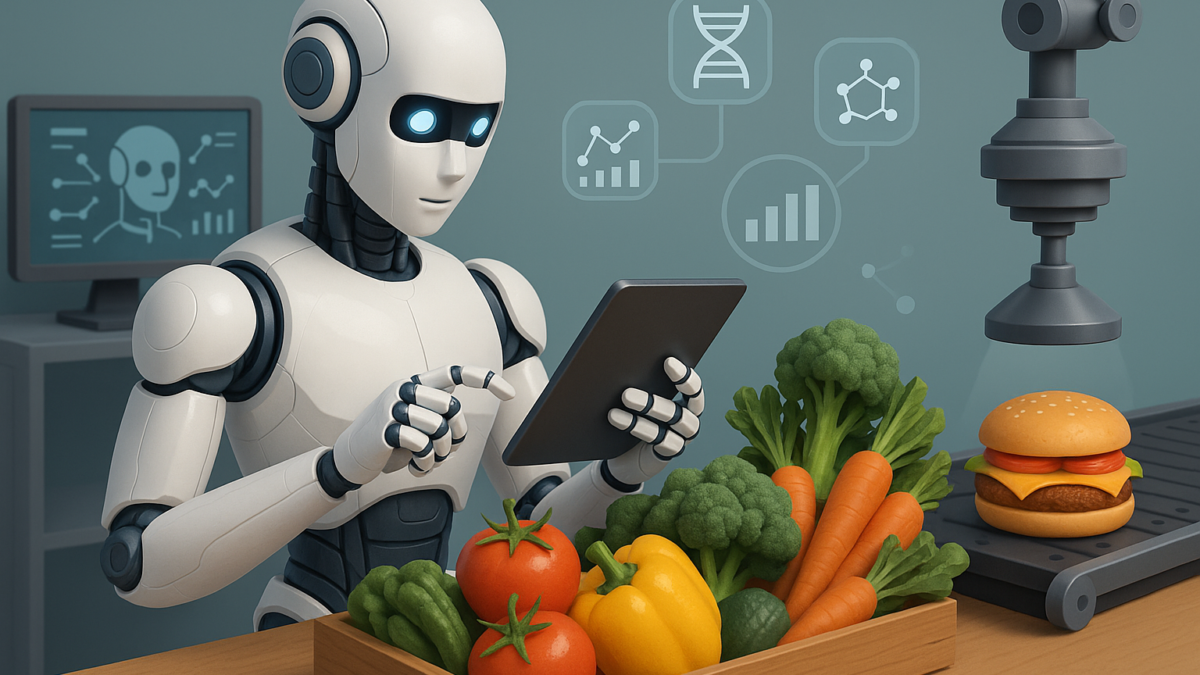AI in FoodTech: How Artificial Intelligence is Transforming the Future of Food
Table of Contents
Introduction
The global food industry is undergoing a radical transformation. As consumer expectations evolve, sustainability pressures grow, and supply chains face disruption, the need for innovation in FoodTech has never been greater. Enter Artificial Intelligence (AI) a technology that is revolutionizing everything from farm production to personalized nutrition.
In 2025, AI is not just a buzzword in FoodTech—it’s a competitive advantage. Companies that leverage AI effectively are improving efficiency, reducing waste, enhancing food safety, and creating tailored dining experiences for customers. This blog explores how AI is reshaping the food ecosystem and why it matters for the future.
AI Across the Food Value Chain
1. Smart Farming and Agriculture
Agriculture is the backbone of the food industry, and AI is making it smarter. AI-powered drones and sensors analyze soil health, predict crop yields, and detect pests early. Machine learning models optimize irrigation and fertilizer use, ensuring higher productivity with fewer resources.
Example: Agritech startups are using AI to forecast crop demand and supply chain needs, helping farmers maximize profits while reducing overproduction.
2. Supply Chain Optimization
Global food supply chains are notoriously complex and prone to disruption. AI enhances demand forecasting, inventory management, and logistics by analyzing real-time data on weather, consumer demand, and market fluctuations.
For example, AI systems can predict which perishable goods are at risk of spoiling during transit and recommend alternative routes, reducing waste and ensuring fresher products reach shelves.
3. Enhancing Food Safety and Quality Control
Food safety remains a critical concern worldwide. AI-driven image recognition tools can detect contamination, irregularities, or spoilage in food products during manufacturing. Predictive analytics can also identify potential risks before they reach consumers.
Large food manufacturers are already deploying AI-powered quality assurance systems that scan production lines in real-time, significantly lowering the risk of recalls.
4. Personalized Nutrition and Consumer Experience
AI is enabling a new era of personalized nutrition. By analyzing health data, dietary preferences, and even genetic profiles, AI-powered apps and platforms can recommend meal plans tailored to individual needs.
Restaurants and food delivery services are also leveraging AI to analyze consumer behavior and provide customized menu recommendations, creating a more engaging and personalized dining experience.
5. Reducing Food Waste
Globally, nearly one-third of food produced goes to waste. AI helps tackle this challenge by predicting demand more accurately, monitoring freshness, and guiding smarter portion control.
Startups in the FoodTech space are using computer vision AI to track food usage in restaurants, suggesting recipes to repurpose ingredients before they expire, and helping retailers manage shelf life more effectively.
6. Product Innovation and R&D
AI is accelerating food product innovation by simulating new recipes, testing ingredient combinations, and predicting consumer acceptance. Companies are even using AI to create plant-based meat alternatives by analyzing flavor compounds and texture data.
For instance, some leading food companies have already used AI to design healthier snacks with reduced sugar or fat—without compromising taste.
Challenges of AI in FoodTech
While the opportunities are vast, challenges remain:
- High Implementation Costs: Small businesses may struggle with AI adoption.
- Data Privacy Concerns: Personalized nutrition apps require sensitive health data.
- Skill Gaps: The food industry needs professionals trained in both AI and food science.
- Regulatory Compliance: Governments are still catching up with AI-powered innovations in food safety.
The Future of AI in FoodTech
As AI technology matures, expect greater integration across the food value chain. The rise of AI-powered kitchens, fully automated farms, and predictive food marketplaces will redefine how we grow, distribute, and consume food.
By 2030, AI could help the food industry cut waste by half, create healthier diets for billions, and ensure sustainable food security in a growing global population.
Conclusion
AI is no longer a futuristic concept—it is the engine driving the next FoodTech revolution. From smart farming to personalized nutrition, AI is creating a more efficient, sustainable, and consumer-centric food ecosystem. Businesses that embrace AI today will lead the transformation of tomorrow.
You May Also Like: The Hidden Influence of Whitepapers: How Decision-Makers Really Use Them in 2025





